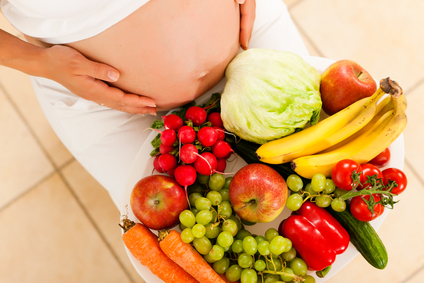Pregnancy is a significant life event for women, involving changes in lifestyle habits and eating patterns, as well as gestational weight gain. The natural gestational weight gain is typically a high concern for expectant mothers, as postpartum weight retention can lead to obesity, decreased libido, and poor self-esteem1. However, according to a recent study, adherence to the Nordic Diet or Nordic Nutritional Recommendations has shown to lower postpartum weight retention.
Between 1999 and 2008, 95,200 mothers were recruited for the Norwegian Mother and Child Cohort Study (MoBa)2. However, only 47,011 women met the criteria and were studied2. Participants were required to provide blood samples and complete food frequency questionnaires regularly until the child reached the age of 7 (2). At one point in the study, women were asked to weigh their food for 4 days, comply with a 24-hour urine collection, and wore a motion sensor to assess daily energy expenditure to eliminate reporting biases 2. Diet adherence was assigned 2 scores, Healthy Eating Index (HEI)-NFG (Norwegian Food Guidelines) and HEI-NNR (Nordic Nutrition Recommendations) comparing actual intake to dietary recommendations2. Analogous linear regression models were used to examine the association between post-partum weight retention, gestational weight gain (GWG), and diet adherence indexes. Substantial weight retention was defined as >5% weight gain compared to pre-pregnancy weight, 6 months after birth 2. The results concluded that both the HEI-NFG and the HEI-NNR were inversely related to risk of substantial weight retention 6 months after birth (Odds Ratio (OR) and 95% Confidence Intervals (CI) per 1 STD-increment: 0.96 (0.94-0.99) for the HEI-NFG and 0.98 (0.95-1.00) for the HEI-NNR) 2. Also after additional adjustment for GWG, these inverse associations were stable 2.
Cohort studies present unique biases and strengths. Pertaining to the present study, the prospective cohort design and large sample size ensuring a wide variation in dietary habits are notable strengths. Also, the use of the HEI-NFG and HEI-NNR adherence scores enabled the qualitative aspect of this research to be represented quantitatively and therefore, reflect overall adherence to the Norwegian food-based guidelines and Nordic Nutrition Recommendations2. In contrast, despite the large sample size, the MoBa sample population is not representative of the population in the United States in terms of ethnicity, age, and economic status. In addition, only 40.6% of women invited to the study agreed to participate2. Also, the assessment period of 6 months post-pregnancy may be too short to appropriately assess weight retention, and post-pregnancy diet and lifestyle were poorly assessed, leaving room for confounding factors, such as new exercise routines, breast feeding, diet adjustments, etc. Finally, in regard to the limitations of a prospective cohort study design, the use of FFQ’s allows room for both conscious and subconscious misreporting errors. Body weight was assessed based on self-reports and therefore is vulnerable to bias. The study reported that foods perceived as “unhealthy” were under-reported in women with higher BMI 2. It is also a challenge to assess actual intakes, as many pregnant women suffer from morning sickness, weight loss, nausea, etc.
A study on the adherence of pregnant women to Nordic dietary guidelines in relation to postpartum weight retention fills the gap in current research regarding postpartum weight retention. A bias-adjusted meta-analysis provided considerable evidence of an association between excessive GWG and prolonged postpartum weight retention and obesity3. This substantial evidence gave light to the great need for further research of intervention-based studies to address the affect of psychological and physiological factors, diet, and exercise on postpartum weight retention and GWG3. Additional research concluded that psychological factors such as depressive symptoms, anxiety, stress and body image dissatisfaction can result in increased weight retention in postpartum women4. Another study reaffirmed, to a lesser degree, the relationship between early postpartum stress, body dissatisfaction, and postpartum weight retention5. There is room for further intervention-studies on the association between environmental, psychological, and dietary factors on postpartum weight retention.
In summary, the Nordic Diet, composed of 25-40% of daily calories from fat, rich in mono-unsaturated and polyunsaturated fats, whole grains, fatty fish/fish, fresh fruits, and vegetables can reduce excessive weight gain during and post-pregnancy2. Although the components for this diet are relatively expensive menu items, the diet is well balanced and heart healthy. Should one have the resources, I believe this diet can be helpful to achieve and maintain a healthy weight in everyone, not just expectant mothers.
1. Bouchez, C. Better Sex: What’s Weight Got to Do with It? WebMD. Available at: http://www.webmd.com/sex-relationships/features/sex-and-weight. Accessed Feb 20, 2014.
2. von Ruesten A, Lise Brantsæter A, Lissner L, et al. Adherence of pregnant women to Nordic dietary guidelines in relation to postpartum weight retention: results from the Norwegian Mother and Child Cohort Study. BMC Public Health [serial online]. February 2014;14(1):1-22. Available from: Academic Search Premier, Ipswich, MA. Accessed March 6, 2014
3. Mannan M, Doi S, Mamun A. Association between weight gain during pregnancy and postpartum weight retention and obesity: a bias-adjusted meta-analysis. Nutrition Reviews [serial online]. June 2013;71(6):343-352. Available from: Academic Search Premier, Ipswich, MA. Accessed March 6, 2014.
4. Phillips J, King R, Skouteris H. A conceptual model of psychological predictors of postpartum weight retention. Journal Of Reproductive & Infant Psychology [serial online]. July 2012;30(3):278-288. Available from: Academic Search Premier, Ipswich, MA. Accessed March 6, 2014.
5. Phillips J, King R, Skouteris H. The influence of psychological distress during pregnancy on early postpartum weight retention. Journal Of Reproductive & Infant Psychology [serial online]. February 2014;32(1):25-40. Available from: Academic Search Premier, Ipswich, MA. Accessed March 6, 2014.
Reviewed by Viktoriya Wolff







